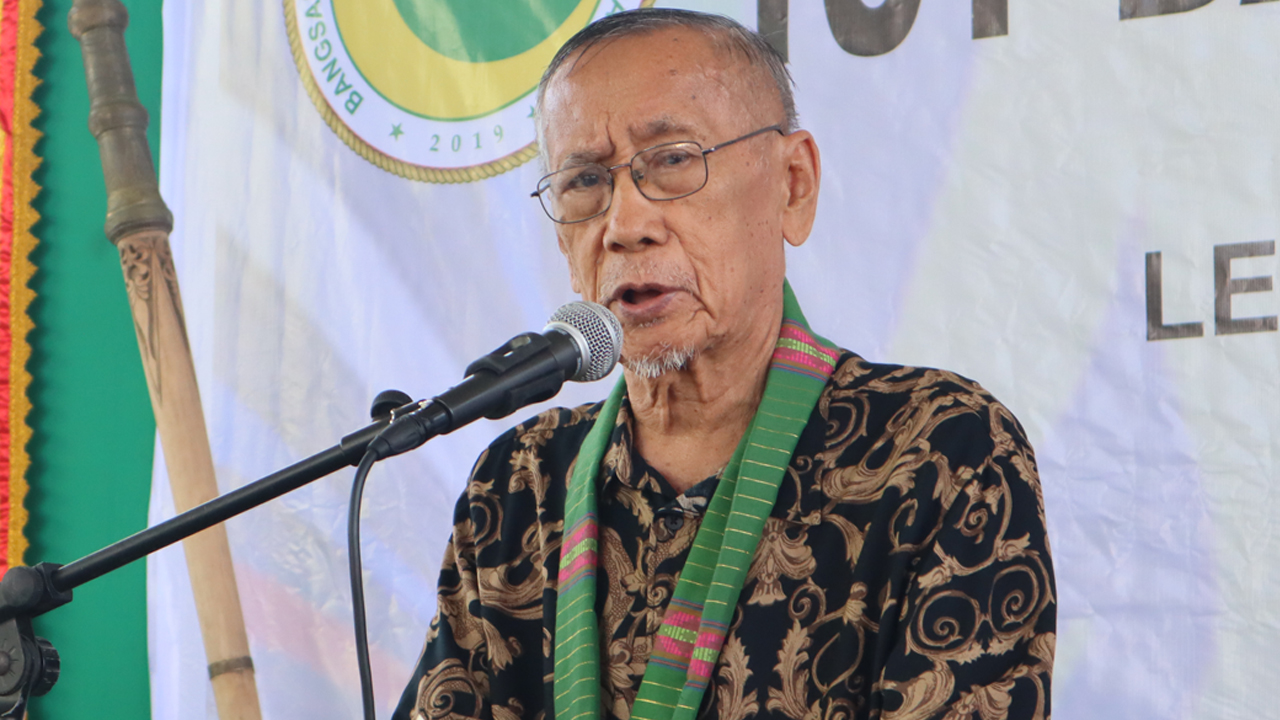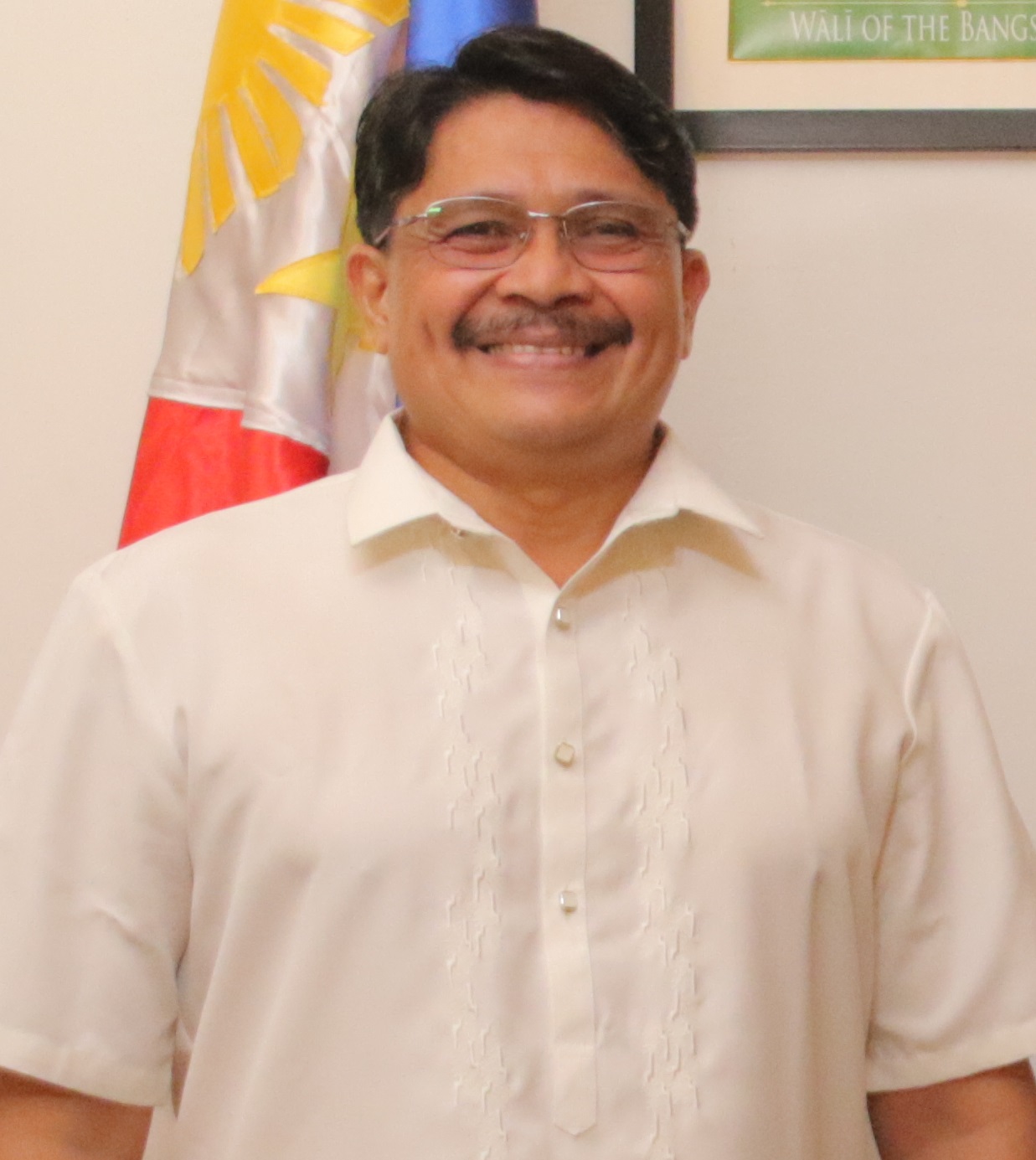His Eminence Sheikh Khalipha Usman Nando, the first Wālī of Bangsamoro and former Chief Justice of the Moro Islamic Liberation Front (MILF) Shari’ah Supreme Court, was, at his early age, one of the students in Madrasah Al-rasheedah at Pandag, Buluan, Cotabato Empire Province (now geographically divided into the provinces of Maguindanao, North Cotabato, South Cotabato, Sultan Kudarat and Sarangani), founded in 1950’s by Cotabato Congressman Datu Luminog Mangelen who later invited Sheikh Omar Bajunaid, an Arab Missionary from Hadhramaut, Yemen to impart his knowledge and spearhead the operation of Madarasah. There he learned reading the Qur’an, Arabic language and other basic subjects like Aqeedah (Islamic Ideology), Fiq’h (Islamic Jurisprudence) etc. from Sheikh Omar Bajunaid. Madrasah Al-rasheedah became one of the Islamic learning institutes whose most of its learners were granted diplomatic scholarship to Al-azhar University in Cairo, Egypt through the initiative of Sen. Ahmad Domocao Alonto and Congressman Datu Luminog Mangelen in a diplomatic dialogue with Gamal Abdul Nasser during the conduct of Bandung Asian-African Conference held in Bandung on April 18-24, 1955. Among his prominent peers in the said Madrasah who later became public figures of Da’awah and Jihad in Bangsamoro Homeland were Sheikh Abdulrahman Bidis and Sheikh Ismael Salendab.
On August 24,1959, Sheikh Khalipha Usman Nando, at the age of 17, was one of the early Moro students sent for a 2nd Batch on a diplomatic scholarship program to Al-azhar University in Cairo, Egypt. There he met Salamat Hashim, who was his senior, along with him were Ibrahim Abdulrahman aka “Abukhalil Yahya” and Omar Pasigan, who themselves served as the first forerunners and founders of Moro Fronts in Cairo, Egypt in 1960. Later their core group grew larger in number and turned into an organization.
According to Salah Jubair (2014) in his book entitled Bangsamoro A Nation Under Endless Tyranny, in 1962, the Philippine Students’ Union (PSU) was organized in Cairo, Egypt. The leading personalities were Salamat Hashim, Khalipha Nando, and Ibrahim Abdulrahman aka “Abukhalil Yahya” and Ismael Guiamel aka “Castro” in Cotabato Empire Province, Abdulbaki Abubakar (who recruited U.P. Prof. Nur Misuari) of Sulu, and Mahid Mutilan of Lanao. Other students who shared the same sentiments were Omar Pasigan, Salman Sangki, Saleh
Loong, Sharif Mohsin Julabbi, Salipada Tamano and Alexander Luqman. Despite being thousands of miles detached from Homeland, Sheikh Nando and his peers were in fact much ahead of forming themselves into an organization which later brought the injustices committed against their people in Homeland into an international forum which caught the attention of Gamal Abdul Nasser, President of Egypt (Jubair, S. 2014).
As they moved forward to organizing the struggle in the Bangsamoro Homeland, Dr. Mohammad Saleh Loong, provided them essential support, including political links to Sabah, and working with Abuhuraira Udasan and other Moro students and leaders for the Second Batch Training of Moro combatants and trainers known as “Top 300”.
As one of the founders of Moro Fronts, Sheikh Nando has been unconditionally serving the Bangsamoro cause for the Right to Self-Determination (RSD) in various capacity for sixty (60) years. He is a senior member of the MILF Central Committee and permanent member of the Jihad Executive Council. He had been a Chairman of the Committee on Education of the MILF Central Committee for 16 years and Chief Justice of the MILF Supreme Shari’ah Court for 14 years. He was also a member of the Ceasefire Committee of the Eastern Cotabato Region and chaired the Bangsamoro Consultative Assembly for two years.
In laying the foundation of the Bangsamoro government after the passage of the Bangsamoro Organic Law and that he is now the only living from among the founders of the Moro Fronts, the Interim Parliament of the Bangsamoro Transition Authority (BTA) constituted under the Bangsamoro Autonomous Region in Muslim Mindanao (BARMM) expressed its consensus on the appointment of Sheikh Khalipha Usman Nando as the first Wālī of Bangsamoro through BTA Resolution No. 1 pursuant to Section 1, Article VIII of Republic Act 11054, during its inaugural Session on March 29, 2019.
Consistent with the parliamentary form of government, the Wālī of Bangsamoro is the ceremonial head of the Bangsamoro Autonomous Region in Muslim Mindanao (BARMM) within the Philippines.
سماحة الشيخ خليفة عثمان ناندو، والي بانجسامورو الحالي ورئيس المحكمة الشرعية العليا لجبهة تحرير مورو الإسلامية، كان في سن مبكرة في الخمسينيات من القرن الماضي، حين درس في مدرسة الرشيدة. بقرية بانداغ، ببلدية بولوان، مقاطعة كوتاباتو الكبيرة (قبل تقسيمها إلى خمس محافظات: هي محافظات كوتاباتو الشمالية والجنوبية، وماجنداناو وسلطان قدرات وسارانجاني)، المدرسة التي أسسها عضو الكونغرس داتو لومينوج مانجيلين. هناك تعلم قراءة القرآن الكريم واللغة العربية وغيرها من المواد الأساسية مثل العقيدة والفقه وما إلى ذلك، تعلم من الشيخ عمر باجنيد، الذي بمساعدته تم تأسيس تلك المدرسة، وهو أحد الدعاة العرب من مدينة حضرموت باليمن.
وفي أواخر الخمسينيات القرن الماضي(24 أغسطس 1959م تحديدا)، كان الشيخ خليفة ناندو من أوائل طلاب مورو الذين أرسلوا إلى جامعة الأزهر في القاهرة. وهناك التقى بالشيخ سلامات هاشم، الذي كان من الطلبة الذين سبقوه وأكبر منه في السن، إلى جانب إبراهيم عبد الرحمن الملقب بـ “أبو خليل يحيى” وعمر باسيغان، الذين خدموا هم أنفسهم كمؤسسين والرواد الأوائل لجبهات مورو في القاهرة في عام 1960م. وزاد فيما بعد عدد مجموعتهم الأساسية بانضمام عدد كبير من الطلبة من مورو لتتحول هذه المجموعة إلى منظمة.
وبحسب ما أورده السيد صلاح جبير (2014) في كتابه بعنوان “بانجسامورو شعب تحت الاستبداد اللامتناهي”Bangsamoro A Nation Under Endless Tyranny، يقول: في عام 1962م تم تنظيم اتحاد الطلاب الفلبينيين (PSU) في القاهرة. وكانت الشخصيات القيادية هم سلامات هاشم وإبراهيم عبد الرحمن الملقب بـ “أبو خليل يحيى” وخليفة ناندو وإسماعيل جميل المعروف أيضًا باسم “كاسترو” من مقاطعة كوتاباتو الكبيرة، وعبد الباقي أبو بكر (الذي جلب البروفسور نور ميســــــــــــــــواري إلى
الجبهة) من سولو، وماهد موتيلان من لاناو. أما الطلاب الآخرون الذين شاركوا نفس المشاعر فهم عمر باسيغان وسلمان سانكي وصالح لونج وشريف محسن جلابي وساليبادا تامانو وألكسندر لقمان.
وعلى الرغم من كونه بعيدًا عن الوطن بآلاف الأميال، إلا أن الشيخ خليفة ناندو وأقرانه كانوا في الواقع متقدمين كثيرًا على تشكيل أنفسهم في منظمة جلبت لاحقًا المظالم التي ارتكبت ضد شعوبهم في الوطن إلى منتدى دولي جذب انتباه أحد قادة المسلمين المتمكن وهو الزعيم جمال عبد الناصر، رئيس جمهورية مصر العربية آنذاك (الجبير، س. 2014).
ومع تقدمهم في تنظيم النضال في موطن بانجسامورو، قدم لهم الدكتور محمد صالح لونج الدعم الأساسي، بما في ذلك الروابط السياسية مع ولاية صباح بماليزيا، والعمل مع أبي هريرة أوداسان وغيره من الطلاب وقادة مورو في تدريب الدفعة الثانية “300 الأوائل” من المقاتلين والمدربين الـ “مورو”.
كان الشيخ خليفة ناندو رئيسًا لجمعية بانجسامورو الاستشارية لمدة عامين؛ رئيس لجنة التربية والتعليم باللجنة المركزية للجبهة لمدة 16 عاما. رئيس المحكمة الشرعية العليا لجبهة تحرير مورو الإسلامية لمدة 14 عامًا؛ عضو بارز في اللجنة المركزية للجبهة والمجلس التنفيذي للجهاد، وعضو لجنة وقف إطلاق النار في منطقة كوتاباتو الشرقية.
والي بانجسامورو هو الرئيس الشرفي لمنطقة حكم بانجسامورو الذاتي في مينداناو المسلمة (بارم) داخل الفلبين.
ومن أجل وضع أسس حكومة بانجسامورو بعد تمرير قانون بانجسامورو الأساسي وكونه الوحيد الذي بقي على قيد الحياة من بين مؤسسي جبهات مورو، أقر البرلمان المؤقت لسلطة بانجسامورو الانتقالية (BTA) الذي تم تشكيله في ظل منطقة حكم بانجسامورو الذاتي في مينداناو المسلمة (BARMM) تعيين الشيخ خليفة ناندو في منصب والي بانجسامورو وفقًا للبند رقم 1، من المادة الثامنة من قانون الجمهورية 11054، خلال جلسته الافتتاحية في 29 مارس
The position of Officer in Charge (OIC) in the context of Philippine governance refers to an official serving their position in an interim or temporary basis or even as the Caretaker or Custodian of the office. The position of OIC is distinct to an official serving in an “Acting” capacity.


